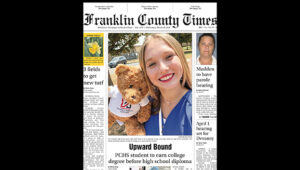Recruiting process fun, flawed
From left, Russellville’s Darrian Graham, Brent Calloway and Robert Terrell celebrate national signing day. Recruiting can be an enjoyable experience, but there is also a dark side to the process. | Scot Beard/FCT
Earlier this week thousands of high school football players across the nation signed national letters of intent to play college football.
Three of those players were from Russellville.
Defensive back Darrian Graham and linebacker Robert Terrell signed with Football Championship Subdivision teams Alabama A&M and South Alabama while running back Brent Calloway announced he is taking his talents to top level at the University of Alabama.
“I enjoy being able to visit these universities and see what they are about,” Terrell said. “I wish I could have more official visits.”
During visits recruits tour the campus and facilities, meet coaches and players and, if they are visiting on game days, have behind-the-scenes access many fans would kill for.
While recruiting can be a fun process for players, it is becoming a big-time business that can also be intrusive and frustrating for players and their families.
“It stresses you out. All the stuff in your head, you just have to fight through it,” Graham said. “Sometimes I thought about giving up, but I look around at all my peers and everybody guides me and pushed me. My mom is a single parent and I can’t let her down.”
The recruiting process can be even more stressful for elite prospects like Calloway. His recruiting journey has become legendary during the final weeks leading up to national signing day.
He verbally committed to Alabama before his junior season, but switched his commitment to Auburn in January. When he announced the change during the U.S. Army All-American Bowl, message boards across the state filled with welcome messages from Auburn fans and condemnation from some Alabama fans.
Calloway reportedly received death threats on his Facebook page. When he visited Tuscaloosa Saturday, some students at the university held up a sing reading “Brent Calloway = Benedict Arnold” during the Crimson Tide’s basketball game against LSU.
Calloway said it was difficult, but he had a plan to deal with the unwanted stress.
“God gives it to people who can handle it,” Calloway said. “I believe I handled it very well. I didn’t reply to it and I didn’t feed it. I let it be and let them say whatever they wanted to say, because at the end of the day it doesn’t matter what they say.”
Calloway’s family also noticed the attention, whether they wanted to or not.
“It was hurtful. I tried not to read it, but I have coworkers telling me what they read,” said Linda Winston, Calloway’s adopted mother. “Brent was starting to think ‘Is it safe for me to go here, is it safe for me to go there?’”
The days leading up to national signing day brought quite a bit of attention to Calloway in newspapers throughout the state. He dropped off the map in Russellville to have some time to himself to make the decision.
When Calloway re-emerged Wednesday to make his decision public he looked nervous as he approached the table in the field house at Russellville. By the time he announced his choice, a visible relief seemed to wash over him.
“It feels great. This has been a long process and it has put a lot of weight on me and my family,” Calloway said. “I’m glad it’s over.”
There was so much attention paid to Calloway’s decision that he was one of the top trending topics on Twitter Wednesday afternoon.
Calloway’s coach, Doug Goodwin, said many of Calloway’s problems stemmed from recruiting Web sites such as Rivals and Scout.
“Everything is so immediate. There is no privacy. Everybody thinks they are entitled to know what is going on,” Goodwin said. “I would do away with Scout and the guys that make money off these kids.”
Banning recruiting Web sites is not the only change Goodwin would make to the recruiting process if he had the power to implement new rules.
He said there are times recruits verbally commit to a school early in the process, but as signing day nears that school rescinds its scholarship offer. That leaves players in a frantic search for a new program to call home.
“That can cost a kid two scholarship offers,” Goodwin said. “The offer from the school the player committed to and schools who would have offered a scholarship if the kid had not been such a strong verbal commitment to the first school.”
Goodwin’s solution to that problem is to force schools to make all offers in writing and not allow an offer to be withdrawn unless the recruit notifies the school he will not attend that university.
“It is so hypocritical,” Goodwin said. “When a college does it nobody says anything, but if a kid changes his mind everybody complains.”
There are other aspects of the recruiting process that frustrate Goodwin. He said he feels one of his responsibilities is to get his players noticed so they can continue their playing careers.
Sometimes there are players Goodwin knows can compete at the next level, but no programs show interest in them.
“It is frustrating to spend time and effort to get them noticed,” Goodwin said. “When they don’t get an opportunity, it is disappointing.”
Calloway did not have problems getting noticed or having offers withdrawn, but he did have to deal with the recruiting Web sites and the frenzy those sites create.
He said the one thing he would change about his recruitment probably would have cut down on much of the negative feedback he has received in the last month.
“I wouldn’t have committed so early,” Calloway said. “Committing early didn’t give me the chance to go out and see as much as I wanted to. I had to keep it at a minimum.
“My advice is to take your time. It’s not going to go anywhere; they are still going to keep recruiting you. The less you talk about it and the less information you give people, the less problems you will have and the more offers you will get.”











